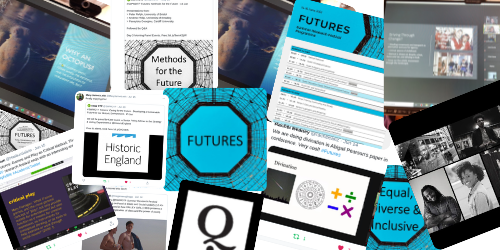
Our first ever student-led SWW DTP summer research festival was a resounding success, celebrating and showcasing the research being undertaken by PhD students across the consortium and beyond. We were pleased to bring together researchers from across the arts and humanities to explore the theme of ‘futures’, and were delighted to have an international reach, with speakers and audience members tuning in from as far afield as France, the US and the Caribbean. We’ve already written about some of the ideas behind the festival and its theme of ‘futures’, and we were excited to see such rich and varied responses to the theme.
Each morning began with a series of conference panels in which PhD students presented papers exploring the idea of ‘futures’ from the perspective of their research. This led to discussions as wide-ranging as ecological futures, the question of agency, the role of family and community in the future, and debates on class, social mobility and developing technology. These discussions benefitted from the vast range of knowledge and expertise across fields. These included, amongst others:
- architecture
- history
- linguistics
- literature
- music
- modern languages
- creative writing
- philosophy
The were plenty of opportunities for creative intellectual exchange.
We were delighted to open the festival with creative readings from Durre Shahwar, Rachel Carney and Joanne Rush, and that we were able to include plenty of other opportunities to showcase the creative and interdisciplinary work of DTP students, with events organised by our research clusters.
The Creativity in Research Cluster displayed some of their work on the DTP website, discussing the use of creative practice-based research methodologies in academia and society, while the Understanding Change and Memory Studies Clusters organised fascinating roundtable discussions, exploring theoretical approaches and interconnections between researchers. There was also an event organised by the DTP’s student-run Question journal, providing a rich opportunity to discuss the importance and possibilities of postgraduate journals, as well as a chance to hear their plans for the next issue.
Other festival highlights included a practical workshop on how to transform our research into games as a way to engage the public, an opportunity to hear from the team trying to discover non-human ways of thinking by using an octopus to code an AI, and an incredible poetry reading featuring alumni from the Obsidian Foundation.
Our keynotes for the festival addressed essential questions for the future: Martin Spafford from Journey to Justice, Andrew Ogun from Arts Council Wales, and Professor Hannah Thompson highlighted the ways in which the future can be made more inclusive and equal through social justice, activism, and challenging the way we see (or don’t see) the world. Kate Guest from Historic England spoke on the threats to our heritage from the environment, and the way in which heritage can be used to address the climate crisis. And finally, David Anderson from National Museum Wales closed the festival with a provocative and inspiring call for museums to become activists for a fairer and more just society.
We were thrilled so many people attended the festival, not only from within the DTP but also from other DTPs and members of the public, despite the fact we were competing with the sunniest weather of the year! We were especially pleased that so many members of the DTP were able to get involved in organising, chairing and presenting during the festival, and hope that this marks the beginning of what will become a strong and lively tradition of annual summer research events.
Categorised in: Latest News